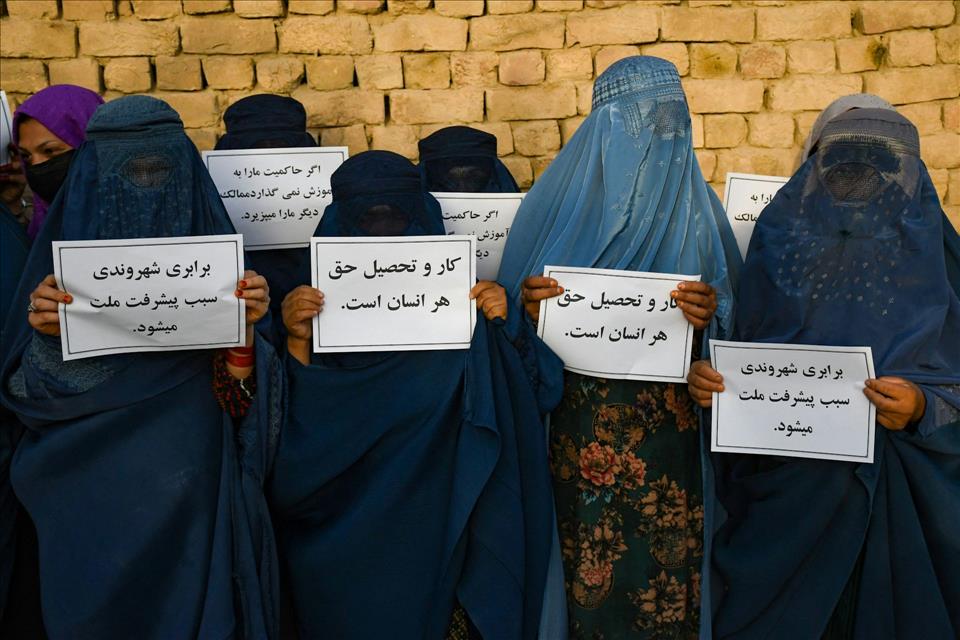
Gender Apartheid: Oppression Of Women Should Be Made A Crime Against Humanity Feminist Academic Explains Why
That lack is now being remedied.
The International Law Commission , a UN expert body, has submitted draft articles for a treaty to the UN's Sixth Committee . This is the main forum for considering legal questions in the UN General Assembly. The intention is to give countries more legal tools to hold accountable those who commit crimes against humanity. It is expected that the treaty process will conclude in October 2024.
The new treaty may include special protection for women.
A group of women activists is lobbying the committee to consider including in the treaty a new definition aimed at protecting women against all forms of oppression. They are advocating for a definition of this discrimination as“gender apartheid”. The idea is that it would track the definition of racial apartheid by replacing the word“race” with“gender”.
Apartheid (Afrikaans for“apartness”) policies were codified in South Africa between 1948 and 1954. The ideology divided South Africans on the basis of race in all spheres of life .
The lobbyists argue that the international community responded comprehensively to racial apartheid after the Apartheid Convention made it a crime in 1973 . This forced the South African apartheid state to be held accountable for the crime. It also imposed an obligation on UN member states to eradicate the institutionalised systematic oppression and domination of black South Africans.
Read more: Ordinary white South Africans and apartheid – bound to a racist system they helped prop up
As an academic who has researched and written extensively on racial and gender equality, I fully support broadening the definition of the crime of apartheid to include gender. I believe this is necessary given the persistence and ubiquity of structural discrimination and violence against women in the world.
I first made a case for this in my 2012 book From Cape Town to Kabul: Rethinking Strategies for Pursuing Women's Human Rights. I argued that when one reads the Apartheid Convention closely, and substitutes“gender” for“race”, the situation of Afghan women, in particular, is identical to the plight of black South Africans under apartheid.
I argued that thinking about constructing a genuine alternative to the realities of women's lives in Afghanistan was to consider the way the international community confronted the eradication of apartheid in South Africa . It would enable a structured global approach responsive to the institutionalised systems of domination and oppression of women, girls and the LGBTQI+ community.
Codifying“gender apartheid” could go much further than protecting Afghan women and girls.
Great progress has been made in the pursuit of gender equality and in stemming gender-based violence. I believe that codifying gender apartheid under international law is an essential component of that continued progress .
It could offer significant relief to many victims and survivors who otherwise would not be entitled to adequate recourse from the international community and from states. It could also lead to a more effective and concerted international response to gender-based oppression.
Fighting gender apartheidThe crime of gender apartheid stands out as unique and pernicious in intent and consequence. It is what legal scholar Patricia Williams has referred to as“spirit murder”. That is a system of dehumanisation, erasure, oppression, domination and persecution.
Read more: Students on the frontline: South Africa and the US share a history of protest against white supremacy
The Taliban's ever deepening and institutionalised oppression of Afghan women and girls is the most vivid illustration of the case.
Multiple UN experts, member states and Afghan women's rights defenders have warned of the deteriorating situation of women and girls in Afghanistan. The concerns became more pronounced after the UN Deputy Secretary-General Amina J. Mohammed on 12 January 2023 warned the international community that in Afghanistan,
Apartheid signage in Johannesburg in March 1948. AFP via Getty Images
In September 2023, UN Women executive director Sima Bahous called on member states to support an intergovernmental process to codify gender apartheid under international law. She said that
Why the argument holds waterOne question that needs answering is whether apartheid can be separated from its association with South Africa. Can we think of apartheid as a crime against humanity that can be removed from its racial context?
The evidence from Afghanistan, for example, suggests the answer is a resounding“yes”.
There is a precedent for this. The crime of genocide originated as a term to describe the crimes in Nazi-occupied Europe in the second world war. It was then applied to genocides that occurred elsewhere in the world, like Rwanda , Cambodia and Sudan . In the same way apartheid ought not to be confined to its racial origins.
Read more: South Africa's genocide case against Israel is the country's proudest foreign policy moment in three decades
International opponents of racial apartheid played a significant role in bolstering South African anti-apartheid activists. In the same way the backing of the global community is crucial to advancing gender justice and women's human rights. It is particularly necessary to support frontline defenders of women's human rights who challenge gender apartheid at great risk to themselves.
As the government of Malta noted in its 2023 written comments on the Draft Crimes Against Humanity Convention:
This view ought to be widely endorsed by the international community.

Legal Disclaimer:
MENAFN provides the
information “as is” without warranty of any kind. We do not accept
any responsibility or liability for the accuracy, content, images,
videos, licenses, completeness, legality, or reliability of the information
contained in this article. If you have any complaints or copyright
issues related to this article, kindly contact the provider above.
















Comments
No comment